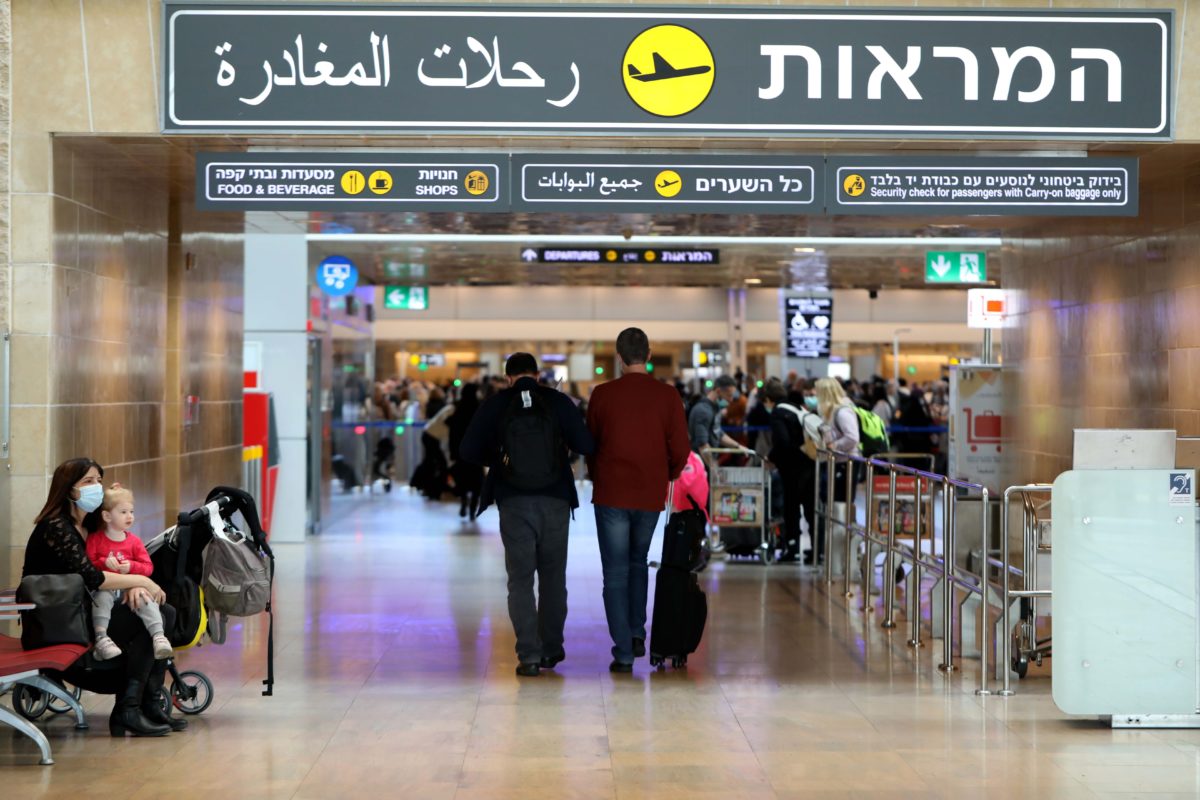Now is the time to fix Israel, Diaspora ties, says JFNA’s Fingerhut
‘This is not like a light switch; you can’t just turn it off and turn it back on. We can’t just go back to the way it was,’ federation leader said

Gil Cohen Magen/Xinhua via Getty Images
People wait at the departure hall at Ben Gurion International Airport near Tel Aviv, Israel, Nov. 28, 2021.
As Israel’s border reopens following the latest COVID-19-related closures, the president and CEO of The Jewish Federations of North America (JFNA), Eric Fingerhut, told Jewish Insider on Thursday that it is critical for Israel and Jewish or Zionist communities in North America to now begin fixing what has been lost due to the travel disruptions and “to develop a set of protocols and approaches that can be utilized in the future.”
“We would be crazy to think this could not happen again,” said Fingerhut, who was in Israel this week to attend the funeral and shiva of Israeli President Isaac Herzog’s mother, Aura Herzog, who died on Monday. “This may not have been in our imagination two years ago, but now is the time for us to put arrangements and protocols in place.”
“I cannot overestimate that Israel travel is a cornerstone of our Jewish and Zionist education and identity,” he continued. “It is the most effective educational tool we have, and we have to invest in it.”
Fingerhut, who leads the umbrella organization of some 146 federations across the U.S., said that despite the pandemic disruptions to Israel travel, including the cancellation of short-term group programs, community missions and independent personal trips, the pandemic had actually brought American supporters of Israel closer together.
“There is a sense of collaboration between Jewish organizations that did not exist before,” he said, explaining that while in the past the various programs competed and operated separately, “they now understand that we have to work together.”
Last week, JFNA appointed Tal Gozani, formerly the chief program officer of the Israeli-American Council, as the executive director of the Israel Travel Alliance (ITA). Established in late 2020, the ITA is a multifaith coalition of more than 90 Jewish and Christian organizations that prior to the pandemic collectively brought more than 80,000 people on long and short-term trips to Israel. The groups are now working together to rebuild these programs following Israel’s sporadic and often inconsistent closures.
Fingerhut said that even though JFNA does not actively organize group trips to Israel, it is ramping up its support, backing the ITA, and assisting in “every way we can to jump-start and re-engage in order to get the important area of Jewish immersive and Zionist education back to full strength.”
Israel opened its border to foreign tourists on Sunday but has yet to permit organized groups to enter. Birthright Israel and other tour operators remain cautious about restarting their trips because of the chaos over the past two years. A spokesperson for Birthright told JI this week that due to the Omicron spread, trips would be postponed until at least early February, and Amos Hermon, CEO of Israel Experience, one of the leading companies for educational group travel to Israel, said he was still “studying the guidelines of the Ministry of Health and preparing for a situation where the rate of infection in Israel was among the highest in the world.”
“We are looking at how to help the industry and the sector as a whole to quickly rebound and get back to full strength,” said Fingerhut. “This is not like a light switch; you can’t just turn it off and turn it back on. We can’t just go back to the way it was.”
“We are working closely with [Israel’s] Tourism Ministry and the Ministry of Diaspora Affairs on this,” he added. “[Diaspora Affairs] Minister Nachman Shai is very concerned about it too and we are working with his staff, as well as the team at the Health Ministry, which makes these policy guidelines to make sure we understand them.”
While two years of border closures aimed at stemming the spread of COVID-19 variants have played havoc with travel between Israel and the U.S., Fingerhut said that he understood the concerns of the Israeli government and the public about incoming visitors.
Highlighting the letter he received last month from Prime Minister Naftali Bennett explaining that the decision to close the border was “not taken lightly,” Fingerhut said, “There has never been a point that the government did not understand the impact of its decisions on the Diaspora.”
“It broke our hearts to not be able to get on a plane and visit family or send organized trips, but we also understand the other side, which was expressed to us by the prime minister,” he concluded.










